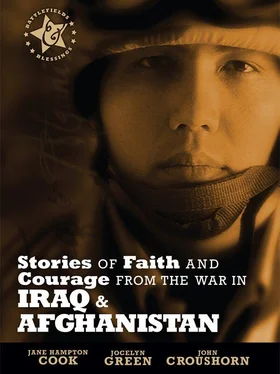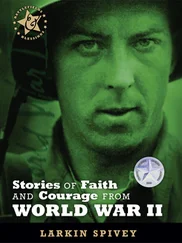The Iraqi people understood this. They were in many ways like any other people. They were family oriented and generally lived amongst family. We met with the sheik of the local village. He was a true leader. The people welcomed us into their homes and shared what they had with us generously. They were very clean and polite. They were quite hospitable, and their kindness always appeared to be genuine. They were interested in what we could do to help them not to line their pockets but to help their community and their children.
We worked to help them in many ways. We had been bringing medical and nonperishable supplies and providing labor to restore a local clinic. One of the things that struck me when we went into schools was that the girls were afraid of us at first. The boys were not afraid of anything. The girls didn’t really know what to make of us. The teachers had to let them know that we were not there to cause them any harm. We were there to help them and give them school supplies. It was one of the more human things we did. To reach out and help the Iraqi people in very real and practical ways was important. It allowed us to experience the sincere appreciation of the people.
Prayer:
Dear Lord, may you help our country’s soldiers to act righteously in Iraq and Afghanistan. Please use their righteous acts to lead many Muslims to see your good hand in their lives. May they give you praise.
“Consider the voice of the singers at the watering places. They recite the righteous acts of the LORD, the righteous acts of his warriors.” (Judges 5:11)
November 15
DEVELOPING MY FAITH
Brig. General (ret) Paul Casinelli, MD
It has been said that war is a mix between short moments of excitement and long periods of boredom. You had to have discipline and a plan for the “down time.” There are always books to read or exercise. When you go to war you should have a plan for what to do with that extra time. Reading through the Bible or studying the Bible is a wonderful way to do this. The Officer Christian Fellowship program ( http://www.ocfusa.org/) or other Bible study tools are wonderful for this purpose as well.
I would sit down at the computer and type out the passage of scripture I was studying, and I would comment on it and send it by email to my sons. I felt connected to them when I sent my thoughts on Scripture. I felt like I was still leading my family from afar.
One of the verses that always hit me while I was there was Isaiah 40:31: “But those who hope in the LORD will renew their strength. They will soar on wings like eagles; they will run and not grow weary, they will walk and not be faint.” This verse was appropriate for me in so many ways. I was a colonel then, and an eagle symbolizes this rank. ‘Waiting on the Lord’ seemed appropriate given the time I spent alone. Not ‘growing weary’ was a constant effort. Psalm 23 also played a role in my deployment, with the idea that I could not rest but rather that the lord would cause me to ‘rest in green pastures.’
All of these experiences led to a growth spiritually that I had not experienced before. What surprised me was not only the amount of growth and confidence that developed in my faith, but also the depth that has remained over the last five years since my return home. The growth of my faith was one of the realities of my deployment. It was as constant as the never-ending routine and tutti-frutti ice cream at every dining facility.
Prayer:
Dear God, I’m thinking of a soldier serving you in Iraq or Afghanistan or now back from his tour(s) of duty. Cause that soldier to grow in faith, share it with others, and come to a full understanding of every good thing we have in Jesus Christ.
“I always thank my God as I remember you in my prayers, because I hear about your faith in the Lord Jesus and your love for all the saints. I pray that you may be active in sharing your faith, so that you will have a full understanding of every good thing we have in Christ.” (Philemon 1:4–6)
November 16
EXPLOSIONS
Sergeant Major “Ted,” special operations medic (name changed for security reasons). As a senior assault medic, he deployed more than a half dozen times to the war
The blast was incredible. I heard nothing. I felt everything. I was looking at the observation point (OP) outside of Kandahar, about to drink my first cup of coffee just after daybreak in December of 2001 then there was a flash, and suddenly we were physically not there anymore. The shockwave was like being hit by a wave in the ocean. It took our breath away. We were only sixty meters from the impact point. No one could hear anything after the explosion.
My sergeant major was standing to my left outside the building in front of a door. When the blast occurred it blew him through the door and on the pile with the rest of us. To put it in context, that amount of explosives was approximately one quarter to one third of what was used in the Oklahoma City bombing.
There were people standing close enough to the explosion to get flash burns on their eyes and second-degree burns on their chest from the actual heat and flash of the explosion but were otherwise relatively un-injured. Yet people far away were literally cut in half. There were people well within the lethal circle that were not killed. When the OP was hit directly, one soldier was simply gone and another was blown forty feet and only had a few scratches. The disparity of who gets the worst injury and where they were in relation to the explosion repeated itself over and over again.
It defies what we would assume to be logical. We think all those that are inside the lethal circle should be dead or seriously injured but that’s not the case at all. It’s very diverse what happens to people.
What we don’t understand about explosions is related to what we don’t understand about life. There is a time and a place where each person is going to die. At that point they’ll be accountable for what they’ve done in this life.
Prayer:
Lord, lead us to the conclusion that we have just one life to live and that life will soon pass. May we live with the understanding that only what is done for you during our lives will be of lasting importance. Amen.
“Just as man is destined to die once, and after that to face judgment.” (Hebrews 9:27)
November 17
CASUALTY COLLECTION POINT
Sergeant Major “Ted” is a special operations medic
Initially, we were unaware that it was a bomb. All we knew was that we had been hit. We were ready to defend our position when the call came down that Americans were down the hill and we needed to take the hill. Running outside, I encountered the masses of casualties: close to one hundred people were wounded or killed in that immediate area.
The shrapnel pattern from the 2000 pound JDAM bomb went down in front of and behind the observation post. There were a lot of Afghan forces in front of the observation point watching the bombing and they were hit too. Our small special operations force was now the only force defending the position. There was no other force in the area that could lend assistance; and for all we knew the Taliban had scored a direct hit and were beginning an attack.
The casualties were easy to identify but sometimes difficult to find. Some got blown under vehicles, others were buried, some laid in heaps. There was a village nearby and they began to come out after the explosion. They were curious but some were looting the wounded and dead. This furthered the chaos and absolute anarchy of the situation. We established a Casualty Collection Point (CCP) in between the two buildings. There were munitions preset in the OP to defend the position and they began to detonate and send ordinance directly at us. When this began to happen we had to move the CCP to a point better shielded from this incoming fire.
Читать дальше












